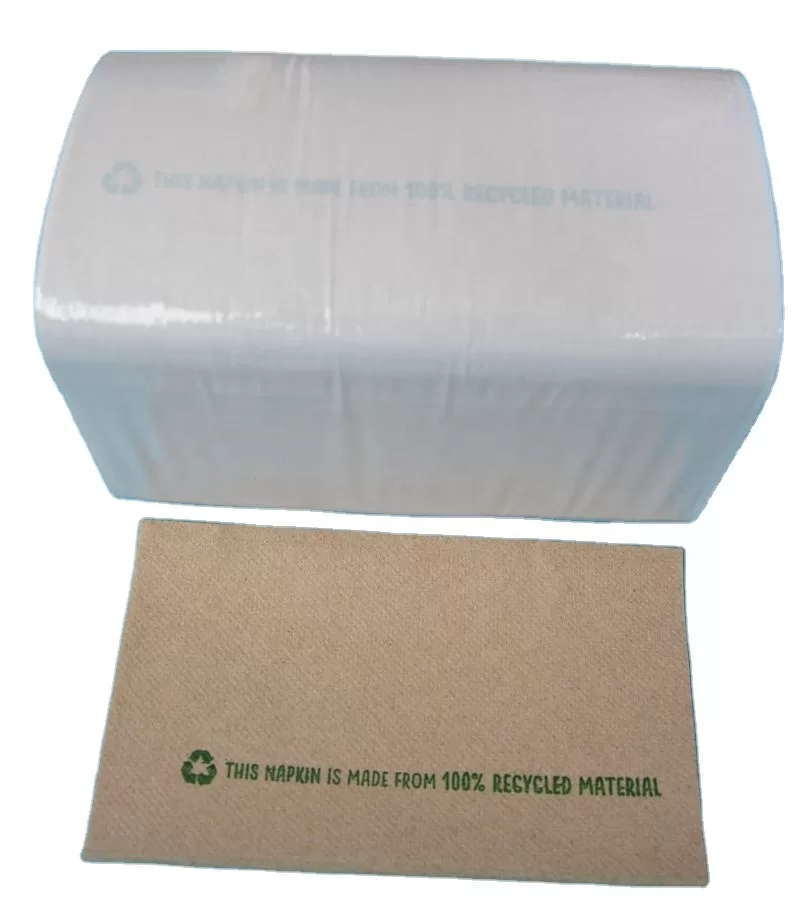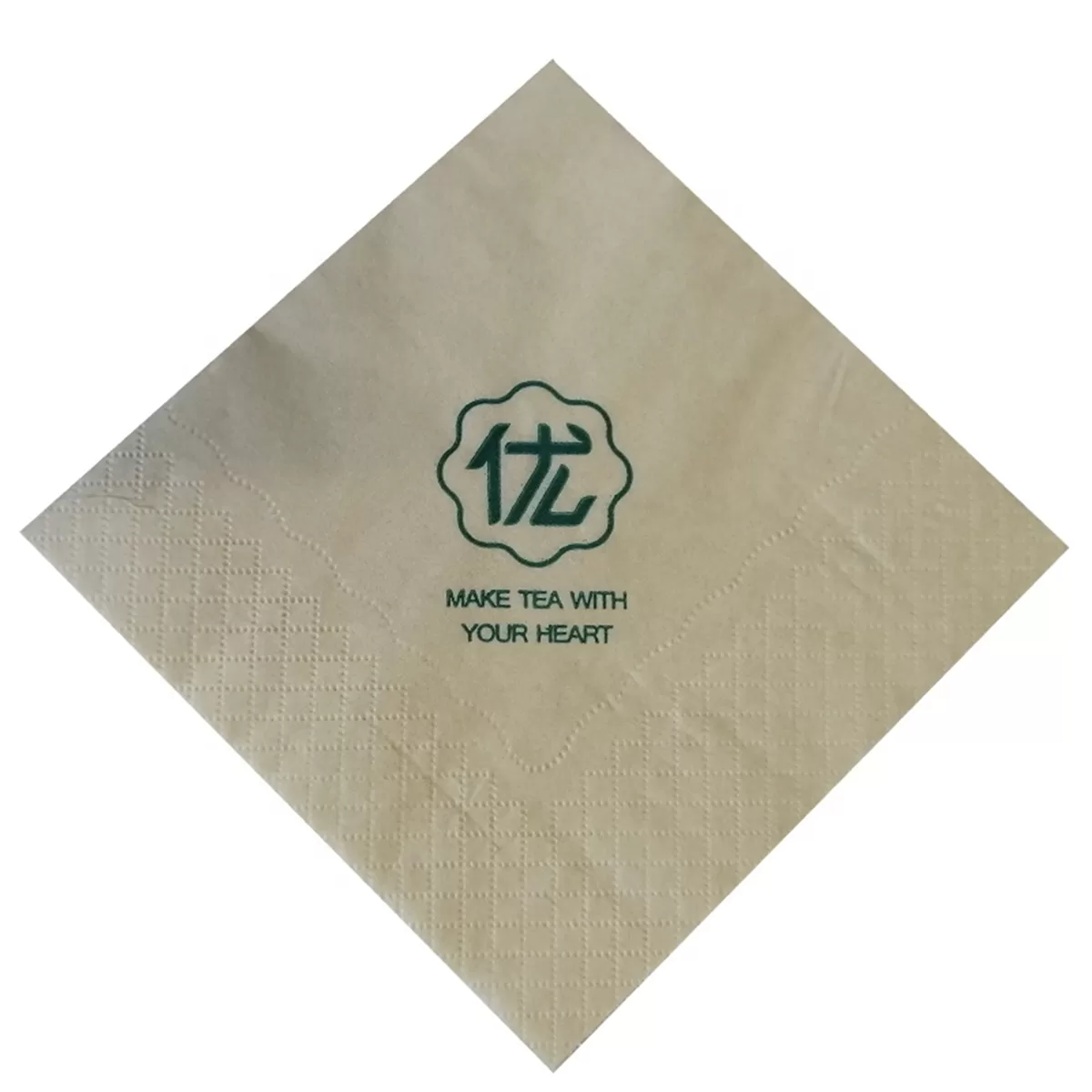>> The TLP Latest News
WHAT ARE THE DIFFERENCES BETWEEN QUILTED NAPKINS AND ORDINARY NAPKINS?
Telling Paper
Texture:
- Quilted Napkins: Quilted napkins have a textured, embossed pattern on the surface that resembles a quilt or a pattern of raised squares. This embossing adds a soft and plush feel to the napkin, enhancing its thickness and absorbency.
- Ordinary Napkins: Ordinary napkins typically have a smooth and flat surface without any embossing or raised patterns. They are simpler in texture compared to quilted napkins.
Thickness:
- Quilted Napkins: Due to the embossed pattern and additional layers created by quilting, these napkins tend to be thicker and more absorbent compared to ordinary napkins.
- Ordinary Napkins: These napkins are usually thinner and may have a more straightforward construction without the added layers created by quilting.
Appearance:
- Quilted Napkins: The embossed patterns on quilted napkins provide a decorative and aesthetically pleasing appearance. The quilting design can vary, offering different visual effects.
- Ordinary Napkins: Ordinary napkins have a simpler and more utilitarian appearance without the decorative embossing found in quilted napkins.
Softness:
- Quilted Napkins: The quilting process often contributes to increased softness, making these napkins feel more luxurious and comfortable.
- Ordinary Napkins: While still soft, ordinary napkins may not have the same level of plushness as quilted napkins.
Use Cases:
- Quilted Napkins: Due to their thicker and more absorbent nature, quilted napkins are sometimes preferred for more formal occasions or events where a touch of elegance is desired.
- Ordinary Napkins: Ordinary napkins are suitable for everyday use, quick cleanups, or casual settings where a simpler napkin is sufficient.
In summary, quilted napkins are characterized by their embossed, textured patterns, increased thickness, and softer feel, making them suitable for occasions where a more upscale appearance is desired. Ordinary napkins, on the other hand, are simpler in design and construction, making them well-suited for everyday use and more casual settings.

Pain Points in In-Vehicle Tissue Procurement
This article addresses the pain points in in-vehicle tissue procurement for automotive-related purchasing scenarios (such as auto 4S dealerships, car rental companies, and OEM gift kits) — including sliding rectangular tissue boxes, tissue waste due to dampness, inability to align with brand identity, and mismatches between bulk orders and actual in-vehicle usage needs — and proposes cylindrical car tissues as a solution.

Ever Stress Over Christmas “Packaging Hassles”?
Fixing holiday packaging woes (wasteful plastic wrap, messy bags), they’re festive (no wrapping), sturdy/reusable (biodegrades in 6w), and work as decor—perfect for gifting, markets, cutting hassle & waste.

The Unsung Hero of Delicious Meals: Greaseproof Paper
Greaseproof paper: food-safe (non-toxic coating), keeps fried foods crispy, stops baking stickiness. Has FSC/compostable eco options—simplifies meals for home cooks, cafes.

Paper Cups 101: All the Essentials You Should Understand
Paper cups, daily staples with varied production & specs, matter for sustainability. Made from sustainably – sourced paperboard via sheeting, coating (PE/PLA/wax), forming, curling/trimming, & inspection. Coatings like PE (common, moisture – proof), PLA (eco, biodegradable), or niche wax. Printing methods (flexographic, digital, offset) suit different orders. Types include single – wall (cold, needs sleeve for hot), double – wall (hot, insulated), ripple – wall (textured, good for very hot), & PLA – coated (sustainable, hot/cold). They can cut plastic waste by 30%, carbon emissions by 40%, appealing to 73% of consumers prioritizing sustainable packaging—a win for restaurants & the planet.

What Toilet Paper Is Septic Safe?
Toilet paper suitable for septic systems should be rapidly decomposable, made from natural materials (such as bamboo or recycled paper), free of chemical additives (fragrances, dyes, etc.), and often carry certifications like BPI to reduce clogging risks. Regular toilet paper, due to its thick layers, synthetic components, or binders, tends to accumulate in septic systems, leading to malfunctions. To identify suitable options, check for “septic-safe” labels and ingredient lists, prioritizing bamboo or recycled paper products (e.g., Caboo, Seventh Generation). Additionally, avoid non-paper products like wet wipes and complement with maintenance practices such as limiting water usage and regular tank pumping to ensure efficient system operation.

Are all paper napkins compostable?
In an era of growing environmental awareness, the compostability of paper napkins—often overlooked—varies significantly. Compostable napkins, made from unbleached paper, bamboo, or other plant-based fibers, contain no harmful chemicals and break down naturally in compost environments. However, not all paper napkins qualify: those made with bleached paper (containing toxic chemicals) or coated with plastic/non-biodegradable materials are unsuitable for composting.

What’s the Best Paper Towel Roll Size?
Paper towel roll size, defined by key measurements like diameter (4–8 inches), width (11 inches standard), sheet size (11×11 inches or select-a-size), and core size (1.5 inches standard or coreless), directly impacts usability. Standard rolls (4–6 inches, 60–120 sheets) suit small spaces, while jumbo/mega rolls (7–8 inches, 150–300+ sheets) serve high-usage areas. Size affects storage (jumbo needs more space), dispenser fit (width/diameter compatibility), cost (larger rolls often lower per sheet), and sustainability (fewer cores/packaging in bigger rolls, recycled/coreless options reduce waste). Choosing the right size depends on usage, space, and eco-values—ensuring convenience, savings, and alignment with needs.

Jumbo Bath Tissue: Engineering Efficiency, Sustainability, and Performance for Modern Spaces
Jumbo Bath Tissue is an engineered hygiene solution that merges high performance with sustainability. Featuring 3x the capacity of standard rolls, it reduces replacements by 67%, cutting maintenance labor costs significantly for both commercial and residential use. Built with advanced materials—including FSC-certified fibers and post-consumer recycled content—and TAD technology, it delivers 40% better absorbency and 30% higher tensile strength while maintaining softness.

Your Pocket’s Everyday Hero: Pocket Tissues That Simplify Life
Ultra-compact pocket tissues – the everyday hero for on-the-go hygiene.
Crafted from FSC-certified fibers (plastic-free packaging), these 3-ply soft-yet-durable tissues offer **customizable designs with low MOQ**, blending sustainability and convenience seamlessly.
>> We will reply to your inquiry within 24 hours
- Company: Shenzhen Telling Commodity Co., Ltd
- Phone: +86 13554899392
- Email: info@tellingpaper.net
- Whatsapp: +86 13554899392
- Wechat: +86 13554899392
- Rm.1002, Shenkan Building, Shangbu Middle Road, Futian District, Shenzhen China Po518028
CONTACT US
Our Products
Our All News
Blog
TLP is a manufacturer of Paper source. The Tissue, Paper Food Packaging and other products produced are all over the world.
Other Products News
TLP is a Paper Source factory, We are professional Paper Source and Garbage Bag manufacturer, please feel free to contact us: info@tellingpaper.net
Paper Food Packaging News
TLP is a Food Paper Packaging factory, We are professional Paper packaging manufacturer, please feel free to contact us: info@tellingpaper.net
Paper Tissue News
TLP is a Paper Tissue manufacturer, We are professional Paper Tissue factory, please feel free to contact us: info@tellingpaper.net



